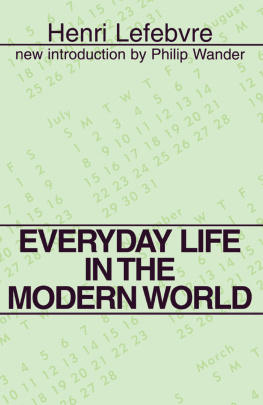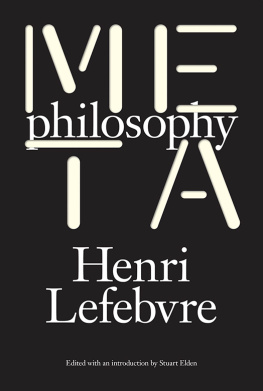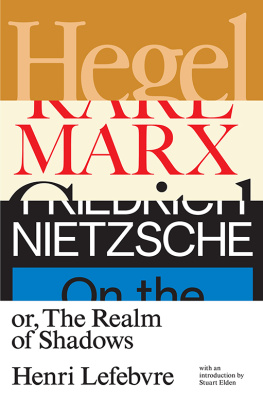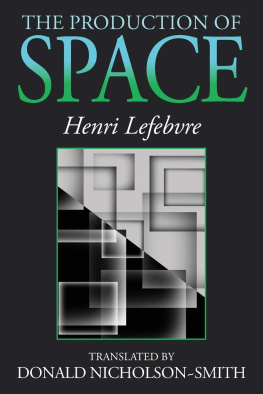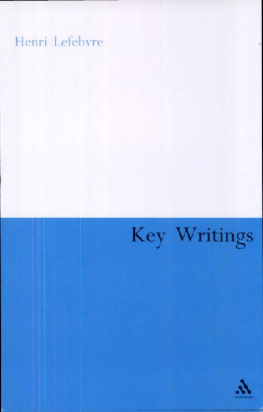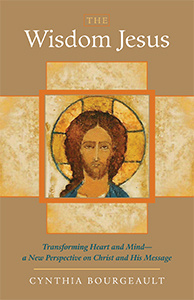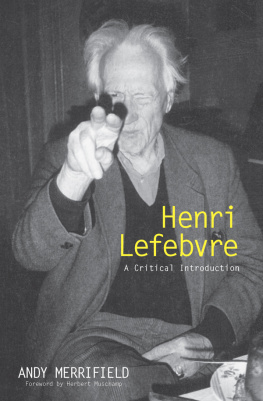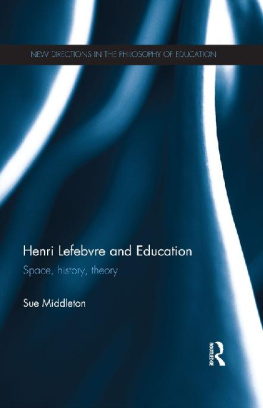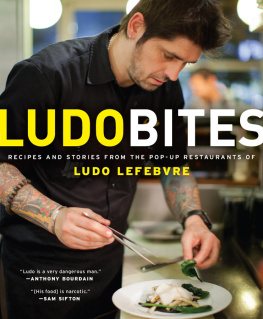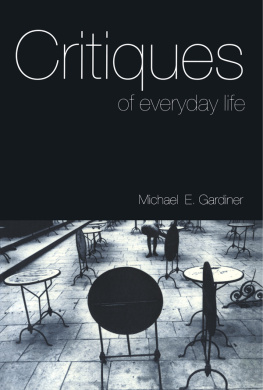Henri Lefebvre - Everyday Life in the Modern World
Here you can read online Henri Lefebvre - Everyday Life in the Modern World full text of the book (entire story) in english for free. Download pdf and epub, get meaning, cover and reviews about this ebook. year: 1984, publisher: Transaction, genre: Religion. Description of the work, (preface) as well as reviews are available. Best literature library LitArk.com created for fans of good reading and offers a wide selection of genres:
Romance novel
Science fiction
Adventure
Detective
Science
History
Home and family
Prose
Art
Politics
Computer
Non-fiction
Religion
Business
Children
Humor
Choose a favorite category and find really read worthwhile books. Enjoy immersion in the world of imagination, feel the emotions of the characters or learn something new for yourself, make an fascinating discovery.
- Book:Everyday Life in the Modern World
- Author:
- Publisher:Transaction
- Genre:
- Year:1984
- Rating:3 / 5
- Favourites:Add to favourites
- Your mark:
- 60
- 1
- 2
- 3
- 4
- 5
Everyday Life in the Modern World: summary, description and annotation
We offer to read an annotation, description, summary or preface (depends on what the author of the book "Everyday Life in the Modern World" wrote himself). If you haven't found the necessary information about the book — write in the comments, we will try to find it.
Everyday Life in the Modern World — read online for free the complete book (whole text) full work
Below is the text of the book, divided by pages. System saving the place of the last page read, allows you to conveniently read the book "Everyday Life in the Modern World" online for free, without having to search again every time where you left off. Put a bookmark, and you can go to the page where you finished reading at any time.
Font size:
Interval:
Bookmark:

Everyday Life in the Modern World
Classics in Communication and Mass Culture Series
Arthur Asa Berger, Series Editor
Agit-Pop, Arthur Asa Berger
The Astonished Muse, Reuel Denney
Beyond Words, Kurt W. Back
Blind Men and Elephants, Arthur Asa Berger
Communication and Social Order, Hugh Dalziel Duncan
Desexualization in American Life, Charles Winick
Everyday Life in the Modern World, Henri Lefebvre
The Flow of Information, Melvin DeFleur and Otto N. Larson
The Hollywood TV Producer, Muriel G. Cantor
Humor and Laughter, Antony Chapman and Hugh Foot
Jewish Humor, Avner Ziv
Life Studies of Comedy Writers, William F. Fry and Melanie Allen
Mass Media in Modern Society, Norman Jacobs
The Play Theory of Mass Communication, William Stephenson
Political Culture and Public Opinion, Arthur Asa Berger
Political Persuaders, Dan Nimmo
Polls and the Awareness of Public Opinion, Leo Bogart
The Public Arts, Gilbert Seldes
Television as an Instrument of Terror, Arthur Asa Berger
Television in Society, Arthur Asa Berger
T.V.: The Most Popular Art, Horace Newcomb
The Uses of Literacy, Richard Hoggart
You Dont Say, Benjamin DeMott
Everyday Life in the Modern World
Henri Lefebvre
Translated by Sacha Rabinovitch
With a New Introduction by
Philip Wander

First published 1984 by Transaction Publishers
Published 2017 by Routledge
2 Park Square, Milton Park, Abingdon, Oxon OX14 4RN
711 Third Avenue, New York, NY 10017, USA
Routledge is an imprint of the Taylor & Francis Group, an informa business
New material this edition 1984 by Taylor & Francis.
Original edition copyright 1971 by Sacha Rabinovitch.
All rights reserved. No part of this book may be reprinted or reproduced or utilised in any form or by any electronic, mechanical, or other means, now known or hereafter invented, including photocopying and recording, or in any information storage or retrieval system, without permission in writing from the publishers.
Notice:
Product or corporate names may be trademarks or registered trademarks, and are used only for identification and explanation without intent to infringe.
Library of Congress Catalog Number: 83-9142
Library of Congress Cataloging-in-Publication
Du Bois, W.E.B. (William Edward Burghardt), 1868-1963.
Dusk of dawn.
(Black classics of social science)
Reprint. Originally published: Schocken Books, 1968.
Includes index.
ISBN 0-7658-0576-6 (alk. paper)
1. Du Bois, W.E.B. (William Edward Burghardt), 1868-1963. 2. Afro-AmericansSocial conditions. 3. United StatesRace relations. 4. Afro-AmericansBiography. I. Title. II. Series.
EL85.97.D73A323 1983 305.896073 | 83-9142 |
ISBN: 0-87855-917-5 (pbk.)
ISBN 13: 978-0-87855-972-5 (pbk)
Contents
Philip Wander
Everyday life is a crust of earth over the tunnels and caves of the unconscious and against a skyline of uncertainty and illusion that we call Modernity, while overhead stretch the Heavens of Permanence; among the greater planets are Scientificness, clear, cold and somewhat shadowy, and the twin planets Virility and Femininity; there are stars, constellations and nebulae; high over the polar horizon we have Technology and elsewhere Youthfulness; there are novae such as reliability, frozen, extinct stars like Beauty and the strange signs of Eroticism; among the fixed stars of the first magnitude we might place Urbanism and Urbanization (so long as we do not omit Naturalness, Rationality and a few others); and then the sub-lunar planets, Fashion (or fashionability) locatable in the vicinity of Femininity, and Sportiveness, etc.
Henri Lefebvre
The question underlying Everyday Life in the Modern World is what gives a society devoted to the all-consuming transitory, and to accelerated change, the illusion of stability. It is a profound question, leading to a radical reassessment of ourselves as products of this world and of our society which, along with other modern societies, is now poised on the brink of unredeemable catastrophe. It is odd to associate all this with everyday life, but this is crucial if we are to follow Lefebvres critique. Everyday life refers to dull routine, the ongoing go-to-work, pay-the-bills, homeward trudge of daily existence. It indicates a sense of being in the world beyond philosophy, virtually beyond the capacity of language to desribe, that we know simply as the grey reality enveloping all we do. In this sphere of nonwork relations we live out our lives with our acquisitions, compulsions, and fears. The way time and space are made up in the urban areas which during the nineteenth and twentieth centuries have grown up around the great factories to house the workersand what this means for the individual is the focus of Lefebvres work and the meaning of what he calls the quotidian.
The modern world refers to the products of industrialization and the controls necessary to socialize workers and regulate consumption. It is a society whose rational character is defined through and has its limits set by highly organized groups (bureaucracies) operating through the state and/or the corporate state; whose purpose lies less in production than in consumption; whose level of operation takes place on and is aimed at influencing everyday life. In this way Lefebvre joins together technological, consumer, affluent, and leisure societies emphasized by other social theorists, into what he calls a society of bureaucratically controlled consumption. Its poetry is found in advertising; its persona is the consumer; and its mechanism for insuring individual conformity lies in the communication of fear fear of being out of fashion, of not being young and attractive, being odd, out of it, the subtle terrors through which advertising motivates.
The intellectual significance of Lefebvres critique is that it identifies an undeniable body of experienceour own in relation to the society in which we liveand challenges its naturalness. Neither nature nor fate, science, or technology determines what is. The shape and content of our lives is the product of a number of decisions in which we do not participate and about which we may or may not be aware. The building in which I live is the product of negotiations between builders, environmentalists, and bankers: its cost, which is a product of interest rates, a depressed construction industry, and the efforts made by unions to preserve jobs, as well as its shapethe kind of building materials used, where it sits on the lot, its relation to the sun at mid-day. The nature surrounding me? Every shrub is planned, its selection influenced by what is planted on the freeways and in front of office buildings (this establishes a fashion and lowers the cost of the plants involved). The sky, the azure blue of romantic poems, is laced with wires the telephone company, electric utilities, and lumber interests did not wish to bury. The sunset, the fiery orb dropping through dark clouds, is a product of automobile and industrial emissions and the efforts of ecology groups to establishing smog controls. The water, the crystal springs gushing forth, its clarity and taste are the result of a struggle between petro-chemical corporations, high-tech industries (that use chemical baths to sterilize the microchips), and groups seeking to improve public health and to promote clean water.
Next pageFont size:
Interval:
Bookmark:
Similar books «Everyday Life in the Modern World»
Look at similar books to Everyday Life in the Modern World. We have selected literature similar in name and meaning in the hope of providing readers with more options to find new, interesting, not yet read works.
Discussion, reviews of the book Everyday Life in the Modern World and just readers' own opinions. Leave your comments, write what you think about the work, its meaning or the main characters. Specify what exactly you liked and what you didn't like, and why you think so.

